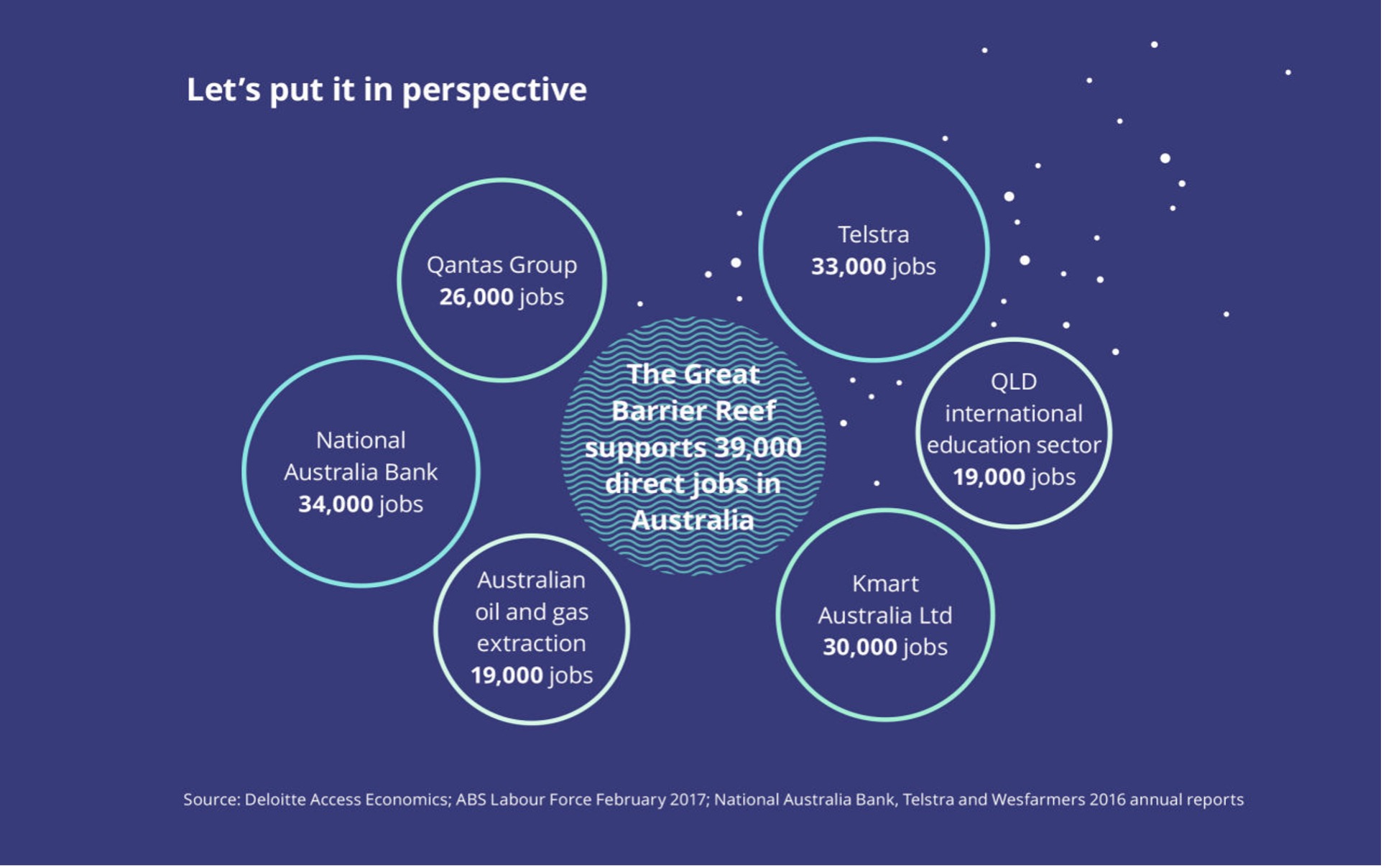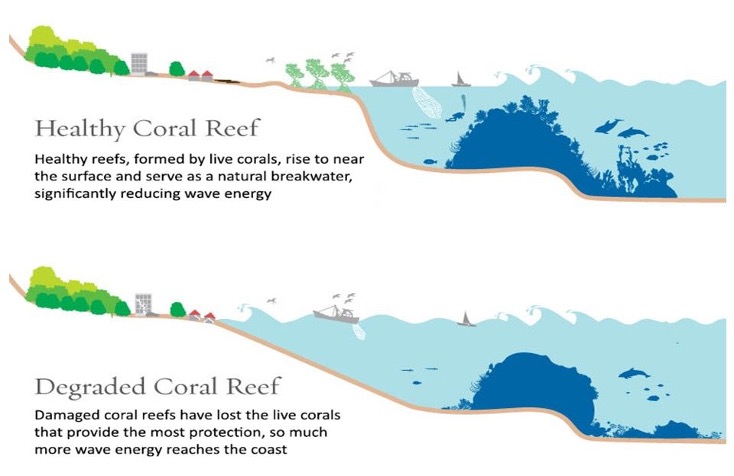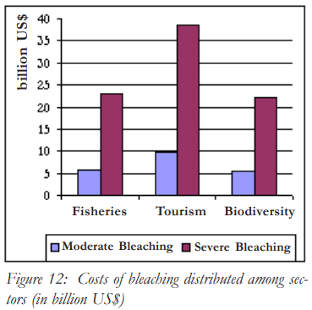Economic Valuation of Reefs
Reefs: From an Economic Lens
Coral reefs are often celebrated for their vibrant biodiversity and natural beauty, but they also play a critical, though often underappreciated, role in the global economy.
Globally, coral reefs provide ecosystem services valued at approximately $11 trillion annually, including coastal protection, tourism, fisheries, and job creation. [1] In Australia, the Great Barrier Reef alone supports over 39,000 jobs, highlighting its critical role in the national economy and job market.

 Photo from “The Value of the Reef.” Great Barrier Reef Foundation, (https://www.barrierreef.org/the-reef/the-value.)
Photo from “The Value of the Reef.” Great Barrier Reef Foundation, (https://www.barrierreef.org/the-reef/the-value.)
In the United States alone, coral reef-associated fisheries are estimated to be worth over $100 million annually, while local economies benefit from billions of dollars in reef-related tourism and recreation. [2] Nearly half of all federally managed fisheries rely on coral reef ecosystems at some stage in their life cycle. The private sector’s economic stake in coral reefs is equally substantial. In regions like the Mesoamerican Reef and the Coral Triangle, the value of reefs to sectors such as tourism, commercial fishing, and coastal development is estimated at $6.2 billion and $13.9 billion per year, respectively. With healthy reefs, these regions are projected to gain an additional $34.6 billion to $36.7 billion in economic benefits by 2030. [3] Furthermore, reefs provide indirect economic protection. As natural barriers against coastal flooding and erosion, they help shield communities and infrastructure. For instance, in Florida and Puerto Rico alone, coral reef restoration efforts could help avoid more than $270 million in annual flood damages. [4] Serving millions of people globally, coral reefs are not only ecological treasures but also essential economic assets. These figures underscore their significance, not just in environmental terms but as pillars of livelihoods, industries, and regional stability.
Economic Benefits of Coral Reefs
Implications of Protection by Reefs
Globally, coral reef tourism contributes an estimated $36 billion to the global economy, and it actively plays a substantial role in the economic growth of maritime countries. [5] Just as reef tourism contributes to the global economy, the reef itself possesses many notable economic benefits. One significant economic benefit of coral reefs is that they play a role in protecting the land from tropical storms and hurricanes. Hurricanes are an economic threat to coastal regions in the Southern United States as well as islands in the Caribbean, and coral reefs protect the lives and homes located in those coastal communities as well as reduce that economic threat. However, a new study also made light of the fact that coral reefs not only lessen the impact of waves from powerful storms but can also reduce the chance of contamination of infrastructures like wastewater treatment plants and sewage systems. The Pacific Coastal and Marine Center estimates the reduced infrastructure damage due to coral reefs to be around $3.4 million. [6] The figure below also addresses how a damaged coral reef can negatively impact coastal economies, just as a healthy coral reef positively impacts coastal economies.

 Photo from “Hurricane Coral Reef Assessment and Restoration in Puerto Rico”
(https://noaa.maps.arcgis.com/apps/MapSeries/index.html?appid=b0a4046c33d04a829bd41dfc3061502a)!
Photo from “Hurricane Coral Reef Assessment and Restoration in Puerto Rico”
(https://noaa.maps.arcgis.com/apps/MapSeries/index.html?appid=b0a4046c33d04a829bd41dfc3061502a)!
Interconnectedness of Fisheries and Reefs
Managed fishery species inevitably rely on reef systems for food and shelter. In addition to the economic value attributed to protection, coral reefs also provide significant value due to their relation to regional and global fisheries. According to Dr. Xaymara Serrano of the Habitat Conservation Division, nearly 25% of all marine species depend on coral reefs at some point during their life cycle, making coral reefs nearly essential to the livelihood of fisheries. Around half of federally managed fisheries depend on coral reefs, and it is estimated that the recreational and commercial value of fisheries dependent on reefs is upwards of $100 million. [7]
Medicinal and Economic Value of Reefs
There is also significant medicinal value associated with coral reefs and the species living within them. Chemicals and compounds found in various species within coral reefs have been used as treatment for leukemia, lymphoma, skin cancer, and more. [8] More than half of new cancer drug research is focused on marine species, and many of these species are found in coral reefs around the world. The global cancer drug market continues to grow every year, and the economic value of reefs is continually growing as well. An example of this interconnectedness is the anticancer drugs known as Ara-A and AZT, which are developed from extracts from sponges. Other examples and more information on reefs and pharmaceuticals can be found in the section. Additionally, the value of marine biotechnology has increased exponentially, and it is now likely to be a multibillion-dollar industry. Marine biotechnology also has projected annual growth of 15-20% for the next five years. [9] Ultimately, we continue to discover new medicinal and technological values that can come from coral reefs.
Economic Implications of Reef Degradation
Fisheries Implications Coral reef degradation directly correlates with a decline in fish populations, which can have devastating human and economic consequences. The Food and Agriculture Organization of the United Nations (FAO) states that approximately $6 billion in fisheries products is generated each year from coral reefs alone. [10] The export value of fisheries products in the Western Atlantic was approximately $1.9 billion in 2000. Globally, over three billion people rely on fish as their primary source of protein. In the Caribbean, there are over 120,000 full-time fishers and thousands more part-time workers. [11] The fishing operations in the Caribbean are majority small-scale and artisanal, and do not have the infrastructure to survive extreme reef degradation and population decrease. Without the protection of coral reefs, the decrease in fish harvesting and exports would harm economies and human livelihoods.
Tourism Implications
Coral reefs are a huge draw for tourists in many communities. According to , “the economic contribution of tourism to coral reefs is estimated at $36 billion to the global economy each year.” [5] Without healthy reefs, communities that rely on tourism for their economy are at risk. Degraded and bleached reefs are not ideal for attracting tourists. In Australia alone, tourism generates $6.4 billion a year. [10] Australia, home of the Great Barrier Reef, has experienced a decline in tourist numbers in recent years due to decreased reef attractiveness. Local dive shops, restaurants, hotels, and entire tourist towns in Australia and around the globe could cease to exist if the reefs cannot draw enough visitors. See for more information on ecotourism.

 Photo from “The Economics of Worldwide Coral Reef Degradation”
(http://pdf.wri.org/cesardegradationreport100203.pdf)!
Photo from “The Economics of Worldwide Coral Reef Degradation”
(http://pdf.wri.org/cesardegradationreport100203.pdf)!
Coastal/Environmental Service Implications Coral reefs provide a plethora of environmental services, like protecting the mainland from storms and filtering water. Because of coral reefs, approximately $94 billion is saved in coastal damage costs yearly across the globe. [10] Additional ecological services, like water filtering and sand production, are difficult to place a monetary value on. Additionally, coral reefs have the potential to provide medical breakthroughs and life-changing pharmaceuticals, which are difficult to evaluate monetarily. Coastal development by humans has proven to have devastating impacts on coral reefs. A 2003 World Wildlife Foundation report estimated that 32% of Caribbean coral reefs are threatened by coastal development. [12] This number is certainly much higher in 2025.
Economic Valuation of Reefs in St. John
According to the Pacific Coastal and Marine Science Center, the coral reefs in the USVI provide flood protection, avoiding nearly $47 million in damages to property and economic activity. [13] Coral reefs protect all the regions they’re located across the world, but particularly in St. John and the USVI, they’re integral to the economic market and protections on the land, avoiding highly costly damages. It’s estimated that with a 1-m loss in reef height, the 100-year floodplain would increase across the USVI, causing a possible $151 million in property & economic activity. [13] The reefs in St. John not only provide tourism and economic benefits in this way, but they also protect the coast, which avoids immense damages to land and property that require financial contributions.

 Upper and lower bound estimates of the annual benefits of coral reefs in the USVI, NOAA
(https://www.ncei.noaa.gov/data/oceans/coris/library/NOAA/CRCP)!
Upper and lower bound estimates of the annual benefits of coral reefs in the USVI, NOAA
(https://www.ncei.noaa.gov/data/oceans/coris/library/NOAA/CRCP)!
In 2010 alone, USVI benefited economically from reefs, with them making up to $202 million from tourism, recreation, amenity, coastal protection, fisheries, and research and education. [14] Furthermore, more recently, in 2023, in St. John, visitors who came to the island spent $55.2 million, which went straight into the St. John economy. [15] Since St. John is a national park, it offers a variety of different attractions such as hikes, forests, and, arguably most importantly, the reefs. In 2023, there was $77.7 million in economic output, which is the highest it’s been since 2016. [15] This directly correlates with the timing of Hurricane Irma and Maria in 2017, which demolished many reefs and parts of the natural environment. There was a major drop from 2018 to 2021, during which the environment was recovering from both the hurricane and the COVID-19 pandemic. In 2022 and 2023, coral bleaching was more intense than ever, which degraded the reefs in a way that was previously unheard of.

 Total Economic Output Contributed to Virgin Islands National Park Gateway Economies, National Park Service
(www.nps.gov/subjects/socialscience/vse.htm)!
Total Economic Output Contributed to Virgin Islands National Park Gateway Economies, National Park Service
(www.nps.gov/subjects/socialscience/vse.htm)!
When the reefs and land are doing well in St. John, they support the entire island economically through tourism, recreation, fishing, research, and coastal protection. As seen in years where the island was environmentally struggling or not seeing the same tourism numbers as they had in the past, there was less money coming into their economy overall. The reefs offer immense economic benefits to St. John, including the reefs themselves, the fish and creatures, the local attractions, and so much more. Maintaining the reefs and their health is integral to ensuring a healthy economy for all of those living in St. John who rely on these economic benefits.
References
Bernstein, Abby. “Coral Reefs Are Critical for Our Food Supply, Tourism, and Ocean Health—We Can Protect Them from Climate Change.” Science Policy Review, 25 Aug. 2020, (https://sciencepolicyreview.org/2020/08/coral-reefs-are-critical-for-our-food-supply-tourism-and-ocean-health-we-can-protect-them-from-climate-change/.)!
“How Do Coral Reefs Help the Economy?” NOAA’s National Ocean Service, (https://oceanservice.noaa.gov/facts/coral_economy.html.)!
The Coral Reef Economy: The Business Case for Investment in the Protection, Preservation and Enhancement of Coral Reef Health. United Nations Environment Programme, 2018, (https://www.unep.org/resources/report/coral-reef-economy.)!
“Coral Bleaching Event Can Increase Flood Risk, Economic Losses.” U.S. Geological Survey (USGS), 10 May 2023,(https://www.usgs.gov/programs/cmhrp/news/coral-bleaching-event-can-increase-flood-risk-economic-losses.)!
“Tourism.” Coral Reef Alliance, 1 Sept. 2021, (coral.org/en/coral-reefs-101/why-care-about-reefs/tourism/.)
“Coral Reef Restoration Can Help Prevent Flood-Driven Pollution along Florida’s Coast.” USGS,(www.usgs.gov/centers/pcmsc/news/coral-reef-restoration-can-help-prevent-flood-driven-pollution-along-floridas)!
Fisheries, NOAA. “How Are Fisheries and Coral Reefs Connected?” NOAA, 5 Jan. 2023, . “Medicine.” Coral Reef Alliance, 14 Sept. 2021, (coral.org/en/coral-reefs-101/why-care-about-reefs/medicine/)
Issues. “Life-Saving Products from Coral Reefs.” Issues in Science and Technology, 14 July 2022,(issues.org/p_bruckner-coral-reefs-importance/)!
Colognoli, Martin. “The Economic Impacts of Coral Reef Degradation: A Colossal Global Cost.” Martincolognoli, 21 Oct. 2024, (www.martincolognoli.com/en/post/economic-impacts-coral-reef-degradation)!
Maidens, Jonathan, and Lauretta Marie Burke. Reefs at Risk in the Caribbean. World Resources Institute, 2005. (http://pdf.wri.org/reefs_caribbean_chap5.pdf)!
Cesar, Herman, et al. The Economics of Worldwide Coral Reef Degradation. Cesar Environmental Economics Consulting, 2003(http://pdf.wri.org/cesardegradationreport100203.pdf)!
“The Value of US Coral Reefs for Risk Reduction - US Virgin Islands | U.S. Geological Survey.” Usgs.gov, 2017, (www.usgs.gov/media/images/econ_value-us-coral-reefs-risk-reduction-us-virgin-islands.)!
“The Economic Value of Coral Reefs.” 2013, (www.ncei.noaa.gov/data/oceans/coris/library/NOAA/CRCP/other/other_crcp_publications/Economic_Value_US_Coral_Reefs_Summary_2013.pdf.)!
National Park Service. “Visitor Spending Effects - Economic Contributions of National Park Visitor Spending - Social Science (U.S. National Park Service).” Www.nps.gov, 10 Sept. 2024, (www.nps.gov/subjects/socialscience/vse.htm.)!